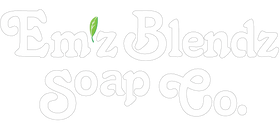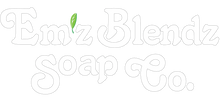1. Why buy handmade natural soap?
2. What's so great about your soap?
3. What is soap?
4. How does soap work?
5. How do you make soap?
6. Do you make all of your products from scratch?
7. What is the difference between natural soap and machine made soap (example: Ivory, Zest, Dove, Oil of Olay, etc.)?
8. What are the soap ingredients?
9. Are your soaps moisturizing?
10. What are essential oils?
11. Do you use synthetic fragrances in your soap?
12. How long will my soap last?
13. Is this Glycerin soap, how is it different from glycerin soap?
14. What is Glycerin?
15. I have very sensitive skin, what should I use?
16. I have acne or problem skin, what should I use?
17. Do you use preservatives in your products?
18. What is Shea Butter?
19. What's different and better about your candles?
20. Do you sell wholesale?
1. Why buy handmade natural soap? (top)
Most industrially manufactured soap contains various undesirable chemicals that can irritate or dry out your skin. They often are made with animal derived fats that contribute no beneficial qualities to the skin. Emz Blendz soaps are made primarily with skin nourishing vegetable oils, which produce a hard bar of soap of luxuriant quality. They are earth friendly, enjoyable to use, and they make for charming gifts. Once you have experienced Emz handmade soap, you'll never go back to unnatural soap again!
2. What's so great about your soap? (top)
Our soap is as good as it gets. It's freshly handcrafted right in our shop in a way that has been historically passed down throughout American History. There are several ways to make soap, but the two most common ways that crafters make soap are the "melt and pour" method and the "cold process" method. We use the "cold process" method.
Melt and pour soap, often called glycerin soap, can be opaque, colored or clear. Some specialty soaps made in this way have shapes or small toys imbedded in a clear bar of soap. This kind of soap is very popular because the soap is colorful, bright and fun. The companies that make soap in this way buy their soap ready-made in bulk form from a large manufacturer. The manufacturer formulates the soap with a solvent that allows the soap to be easily re-melted and manipulated with different colors and fragrances. The soap is clear because the manufacturer adds alcohol, glycerin, solvents, detergent foam boosters and sometimes sugar. This soap makes crafting easy and safe and can be easily found in any craft store. However, this kind of soap is not completely handcrafted or natural. The soap lasts half as long as "cold process" soap because of the solvent in it.
Cold process soap-making or kettle method soap-making (what we do) is the process making soap from scratch. Although soap can be simply made, it involves some chemistry, careful measurement and the cautious use of lye or sodium hydroxide. Traditionally, during colonial days, hardworking women made soap with rendered animal fat on the homestead. This kind of soap was functional but harsh. Today with special calculators, accurate scales and an array of natural vegetable and plant derived fats and oils, we are able to produce exceptional soap that not only cleans well, but also smells fantastic, is aesthetically pleasing and is truly good for your skin.
3. What is soap? (top)
Soap is the neutral product created when the acids of fats or oils chemically react with organic or inorganic bases (sodium hydroxide or lye). This is called the saponification process (soap-making process), after which there is no lye present in the final bar.
4. How does soap work? (top)
A soap molecule is formed as a chain with a head and a tail. The head is drawn to water and the tail to dirt and oil. This allows the soap to connect dirt and oil to water. The water then rinses away the dirt. Soap also prevents water from beading up, allowing it to wet your skin more thoroughly.
5. How do you make soap? (top)
All soap is made up of a fat combined with and alkali (lye). We take carefully selected vegetable oils and butters, known for their skin benefiting properties, and in correct proportions, mix them with lye. When the oil and lye mixture is completely emulsified, we pour the mixture into wooden molds where it sits for 18 to 24 hours. During this time it is saponifing (chemically changing into soap). The soap, now the consistency of soft cheese is cut and put on the curing shelf for 4 weeks while it hardens and mellows into a delightfully mild and creamy bar of soap.
6. Do you make all of your products from scratch? (top)
Yes. All of Emz Blendz products are made fresh, from raw ingredients, so you can be certain that they are as fresh and healthy as possible. Our products are made in small batches and are made continuously to ensure freshness.
7. What is the difference between natural soap and machine made soap (example Ivory, Zest, Dove, Oil of Olay, etc.)? (top)
Well, one only has to experience naturally handmade soap to know there is definitely a difference. But here are some facts: industrially manufactured soap contains various undesirable chemicals and synthetic detergents that can irritate or dry out the skin. They are often made with animal derived fats such as sodium tallowate (a hard fat obtained from parts of the bodies of cattle, sheep, or horses, and used in foodstuffs or to make candles, leather dressing, soap, and lubricants) these fats contribute no beneficial qualities to the skin. Some soap bars can't even be labeled "soap" rather they are labeled "cleansing bar" because they actually aren't soap at all. They are synthetic detergent bars. Almost all are scented with synthetic fragrances and contain a load of preservatives. Just try to read a label and see for yourself.
Another note: Anything that foams is either soap or a synthetic detergent. Nothing else used as a cleaning product produces lather. So, if a person says "I don't use soap" or "I can't use soap", they have most likely experienced the bad side effects of using machine made soap and have turned to either a mild synthetic detergent liquid or ???
Our soap is different because it is extremely mild and moisturizing. People even with the most sensitive skin types can use it. It's made with natural vegetable oils, is never tested on animals (unless you count my kids), is biodegradable (100% if scented with essential oils, 99% if scented with a fragrance), and smells amazing. Yes, it costs a bit more, but it lasts a long time and it's worth it!
8. What are the soap ingredients? (top)
Olive Oil is obtained by pressing the fruit of the olive tree. It is highly nutritive, contains protein, vitamins and minerals. It forms a protective and breathable film on the skin that moisturizes and holds moisture to the skin.
Palm Oil is obtained from the fruit or seed of the palm tree. It is a rich source of vitamin A and makes a nice hard bar of soap.
Coconut Oil is expressed from coconut kernels and promotes a wonderful fluffy lather.
Sweet Almond Oil is pressed from seeds of the almond tree. It has great nutritional value for all skin types.
Shea Butter is pressed from the fruit of the African karite tree. It is extremely therapeutic, soothing and moisturizing and contains vitamin A and E.
Cocoa Butter is expressed from the roasted seed of the cocoa bean. It is high in vitamin E. It protects, softens and lubricates the skin.
Avocado Oil (face soap, baby soap, lotion) is made from the pulp of the avocado plant. It is rich and therapeutic and contains vitamins A, C, D and E, proteins, beta-carotene, lecithin, fatty acids and the "youth mineral" potassium.
Wheatgerm Oil (baby soap) is extremely high in vitamins A, B1, D, E, lecithin, and protein.
Jojoba Oil is technically not an oil, but a liquid wax. It closely resembles natural human sebum (the natural coating our body produces to protect the skin and keep it supple). The reason jojoba oil works so well is that it actually penetrates the skin because it is accepted as sebum.
9. Are your soaps moisturizing? (top)
Yep. They are as moisturizing as soap can get. Most of our soaps are made with the same recipe and are 10% "super-fated". This means that there is 10% of the moisturizing butters left in the bar after saponification (after the oils and lye have turned into a neutral soap).
10. What are essential oils? (top)
Essential oils are aromatic and highly concentrated oils extracted from plants that carry beneficial properties. They are completely natural and are processed by steam distillation. Some citrus oils are made during a process known as "cold pressed" where the oil is pressed out of the rind.
11. Do you use synthetic fragrances in your soap? (top)
We use pure and natural plant essential oils for their medicinal properties and to scent our products whenever they are available. Some scents cannot be produced by plant steam distillation, or for some, the true and natural essential oil is so rare, over cultivated or expensive that we could not produce a practical product. A fragrance is a blend of synthetic and/or natural ingredients creating a specific scent. Used in a few of Emz Blendz products. The products we make, that do contain fragrance, contain only a tiny amount of fragrance oil - 1% or less (which is substantially less than what you find in most other products), because they are meant to be nutritive body treatments rather than “perfumes”. When a desired scent is not available as a natural essential oil, is severely over cultivated as an essential oil, is unstable in preparations, or is extremely uneconomical, we use only high quality, cosmetic grade fragrances. See the scent lists below of purely natural essential oil blends and fragrance blends.
Our purely natural essential oil scent blendz are:
- Camping
- Chamomile Mint and Rose
- Eucalyptus Tea Tree & Mint
- Fresh Mint
- Lavender and Lavender Plus
- Lemon Lover
- Lemon Verbena
- Lemongrass and Lime
- Lithia Park
- Mt. Ashland
- Oregon Spearmint
- Hemp
- Rosemary Sage
- Tea Tree Mint
- Citrus Basil
- Cinnamon
- Patchouli
- Peppermint
- Stress Relief
- Immune Boost
- Sweet Orange & Rosewood
- Herbal Clarity
- All Facial Products
- All Liquid Olive Oil Castile Soaps
- All Aromatherapy Massage Oils and Air Refresher Sprays
- All Baby Products (or left unscented)
- Skin Food
- Natural All-Purpose Cleaner
Our signature fragrance blendz are:
- Chocolate
- Coconut
- Cucumber Melon
- Cranberry Spice
- Gardenia Rose
- Ginger Peach
- Mango Tea
- Oatmeal Milk and Honey
- Sandalwood (soap)
- Strawberry
- Vanilla Bean and Cream
12. How long will my soap last? (top)
Of course that depends on how much and how many individuals are using the soap, but in general one bar of soap will last one person, who uses it everyday in the shower, about 4 weeks. If the bar is used next to the sink to wash hands with, it will last months. To ensure that your soap last's it's longest always leave your soap in a well-drained soap dish and above or out of the way of the showering water where it can completely dry in between uses.
13. Is this Glycerin soap, how is it different from glycerin soap? (top)
Glycerin is naturally produced during saponification (the process of making soap). Our soap contains all of its naturally occurring glycerin. Melt & Pour soap has some added glycerin, but will not last as long as our soap because of the solvent it contains.
14. What is Glycerin? (top)
Glycerin is a humectorant. It draws moisture from the air and holds moisture in, thus making it an excellent skin moisturizer and softener.
15. I have very sensitive skin, what should I use? (top)
All of our soap will be far better than any detergent based commercial soap, but our unscented, extremely mild Baby soap, liquid or bar form Lavender soap, Oatmeal Milk and Honey soap or our Organic Facial soap would be some good suggestions.
16. I have acne or problem skin, what should I use? (top)
Soap suggestions include: Eucalyptus Tea Tree, Pink Grapefruit, Lemongrass and Lime, Lavender, Organic Facial soap all have great antibacterial properties that will help fight breakouts. The Tea tree mint sugar scrub helps slough away clogging dead skin cells (this product has significantly helped many people with acne problems), and the Flower Essence Facial Toners have gentle antibacterial and healing properties. There is also the Anti-Blemish Serum, which is designed to be applied directly to blemishes and problem areas. It contains potent bacteria fighting essential oils, aloe vera, lavender flower essence and Tea Tree essential oil, which is well known for it's natural acne fighting properties.
17. Do you use preservatives in your products? (top)
We use only natural extracts, plant essential oils and vitamin E to naturally preserve our products. Any product containing water (creams and lotions), could potentially be a paradise for bacteria and molds if they weren't properly preserved. For these products, we use a preservative blend consisting of natural extracts, vitamin E, essential oils (natural preservatives), and a globally approved, paraben-free cosmetic grade preservative called phenoxyethanol in minute amounts (less than .5%) in order to keep these products safe and healthy. Minute amounts of cosmetic preservatives can boost the preservative action of natural ingredients preventing bacteria to break down the nutritive ingredients in a product making it less effective or a health risk.
18. What is Shea Butter? (top)
Shea Butter also known as Karite Butter, comes from Central and West Africa where the Shea/Karite trees grow in the wild. So far cultivating the trees has been unsuccessful. The Karite tree produces almond like fruit and the butter is pressed from the pits of the fruit. It is extremely therapeutic, helping to heal dry, cracked, damaged or aged skin. It is readily absorbed by the skin and is renowned for its moisturizing and skin softening properties.
19. What's different and better about your candles? (top)
Most of the world's candles are made from paraffin wax. Paraffin is a petroleum product (a bi-product of oil refining) and it emits harmful soot and fumes when burned. We make all of our candles with 100% pure and natural soy wax or beeswax. These waxes are clean burning, and are 100% natural, renewable resources. All of our wicks are made with 100% cotton. Our candles will burn approximately 50% longer than a paraffin candle of the same size. Soy wax holds and releases scent more effectively and evenly throughout burning and soy wax can be easily cleaned up with warm soapy water. Using soybean products and soy wax candles supports US farmers and the economy.
20. Do you sell wholesale? (top)
Yes, to resale businesses only. We also supply custom labeled guest amenities to Bed and Breakfasts and Inns. Please call 541-482-SOAP or 1-866-676-2726 or email:wholesale@emzblendz.com for more information.




















